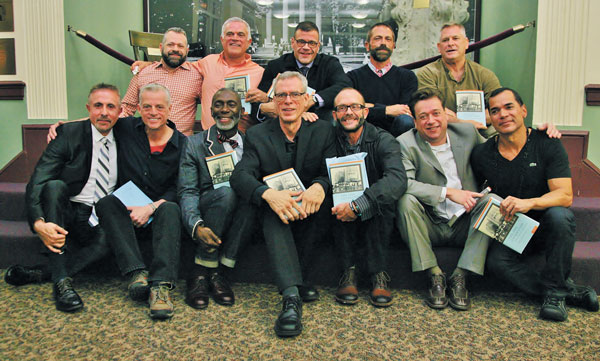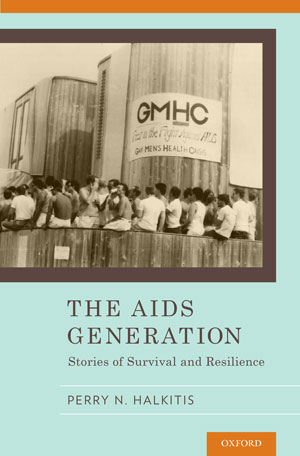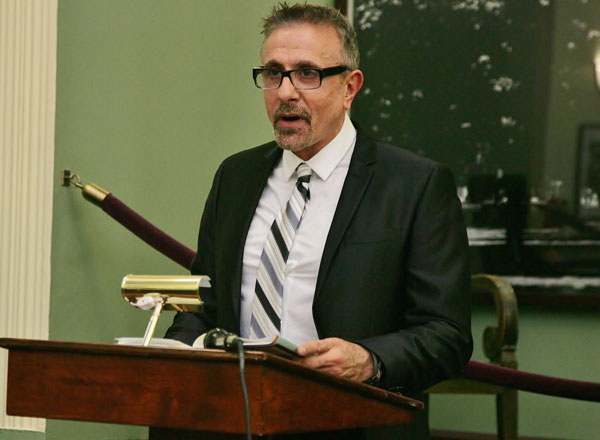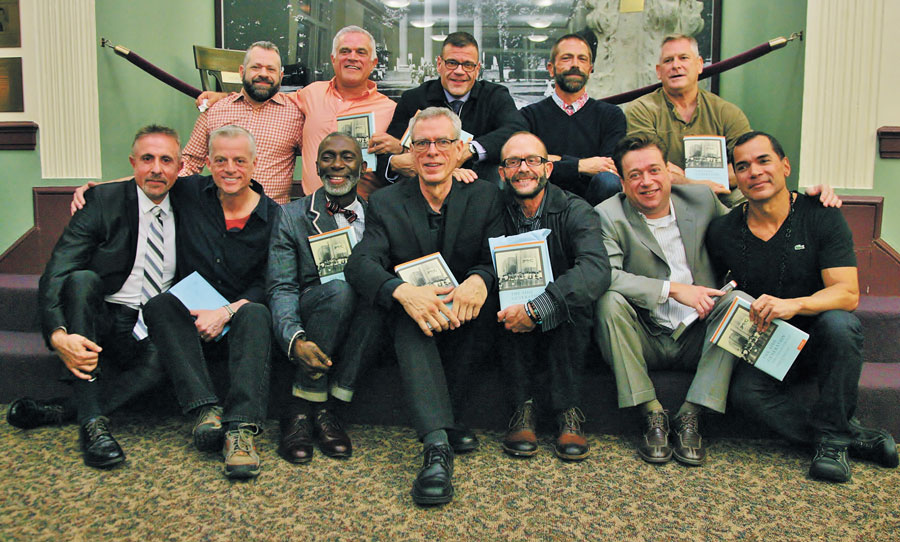
BY SAM SPOKONY | In the midst of a career built on cutting-edge research and studies of the LGBT population, not to mention a personal life full of experiences from the front lines of the HIV epidemic, Dr. Perry N. Halkitis isn’t ready to write his autobiography just yet.
“Maybe when I’m 60,” he said with a laugh, in his office at New York University’s Global Institute of Public Health, a few blocks from Union Square.
The list of his job titles alone makes it clear that Halkitis speaks with a voice of internationally recognized authority, especially for someone who’s not yet a senior citizen. Along with being associate dean of the Global Institute of Public Health, he’s the director of NYU’s Center for Health, Identity, Behavior and Prevention Studies, and a professor of both population health and applied psychology and public health. He has also published numerous academic articles and books that have helped to push his field forward over the past decade, all while finding time to write frequent columns for this newspaper.
And now, at 50, Halkitis will certainly tell you that he was more than ready to break new ground in HIV behavioral studies by publishing a book that draws readers closer than ever into the hearts and minds of men infected with HIV during the early years of the epidemic.
“The AIDS Generation: Stories of Survival and Resilience” — which was published by Oxford University Press and released on October 10 — is a landmark effort to engage both academics and the general public in a powerful contemplation of what it’s really like to be an HIV-positive man living through middle age.
Halkitis defines the AIDS Generation as those gay men who came of age between the late-’70s and early ’90s, who were diagnosed with HIV as young adults during that period, and for whom the diagnosis — before the introduction in 1996 of combination antiretroviral treatment — was seen as a death sentence. The new book centers on deeply personal and compelling interviews with 15 men who have survived and continued living into middle age, and whose words are woven into and around Halkitis’s commentary and research.
It may not be an autobiography, but it is the legacy of his own generation. In the book, he calls it this country’s “bravest generation,” while presenting the stories of his peers — the witnesses of an era — as proof.
“I feel very confident in making that statement, simply because I saw what happened,” said Halkitis. “There’s something about the behavior of that generation of gay men that was extremely brave, while they were fighting this epidemic within a society that wasn’t embracing gay people, and really still isn’t.”

Halkitis’ new book is a landmark effort to engage.
Readers are taken back to revisit the absurdly horrifying experience of the early epidemic, when men across the country were watching friends and lovers die nearly every day, and those who survived were forced to confront their own mortality at every turn.
“I think that, historically, we tend to forget what actually happened, and instead things tend to become more sanitized,” said Halkitis. “If you go to the New York Historical Society’s exhibit on the AIDS epidemic, you see that it doesn’t capture the toll. It’s a very whitewashed version of AIDS, and very sweet. But when we were in the middle of this period, it wasn’t sweet. It was disgusting and awful. And so I felt that, first of all, I had to give a truly accurate portrayal of what things were like.”
We learn about those experiences directly from the men of the AIDS Generation, who in their conversations with Halkitis describe their own memories of confusion and panic as friends died, while coming to terms with their own diagnoses.
In the process of both his interviews and in the commentary he provides as an academic expert, Halkitis explores the methods by which those men were able to accept and cope with the knowledge that they were living with a deadly infection that, at the time, was not viably treatable. Some followed paths that led them to take greater and more positive control over their personal health, by habitually practicing safer sex or overcoming drug and alcohol addiction. Some actually dove further into the dangerous terrain of unsafe sex and drugs, as a way to escape the emotional burden that comes with having a doctor explain that you probably only have a couple of years to live.
Throughout his work Halkitis shows that, regardless of the personal choices they made, these men were resilient every step of the way — and their collective, continuing legacy is one of true survival.
And although readers will of course only see the finished product, Halkitis explained that a defining element of the book was the very emotional experience he had while conducting the interviews, and then of finding the most authentic ways to piecing them together on paper.
“After I did the interviews, I kept listening to them and listening to them, because I wanted to hear their voices, and I wanted to hear where they stuttered, or paused, or cried,” he said. “And then later, by the fourth or fifth draft of the writing, it had become pretty clear to me how things were coming together. I started to see these commonalities, these groupings of ideas and feelings. So I cut out chunks and pieces of the interview transcripts, and I put them together, and then I wrote around them. And that’s really how I wrote the book.”
Meanwhile, the actual writing process was one so powerfully affecting that, as Halkitis admitted, there were times when it seemed like it couldn’t be completed.
“I started writing in August [2012], and I was on sabbatical and just sitting at home by myself all day working on it,” he said. “But by the middle of it, in November, it became incredibly difficult, as emotions from the past were just pushing forward. And those feelings actually manifested themselves in a physical way. Parts of my body would hurt, or I would have anxiety while walking down the street. At one point in November I even stopped and put the book aside for a couple of weeks, because I couldn’t deal with the emotions anymore. So the process was really challenging for me, and even though I’ve done a good job of intellectualizing this for so many years, I learned that I really had to sit there inside my own emotions in order to be able to move forward with the project.”
That soul-searching experience was also deeply felt by the 15 men with whom Halkitis explored this emotionally treacherous territory. Reading “The AIDS Generation,” it becomes clear that these men recognized that their interviews were not just the cold, hard stuff of academic research. As Halkitis bluntly — and non-judgmentally — probes to find the inner sources of frustration, struggle and hope amid the ravages of the disease, the men often respond just as directly, not only with intense honesty, but with a sense of sharp wit and keen self-understanding that lifts their stories up off the page.
“It was really a very healing process for me,” said Lee Raines, 59, who was interviewed for the book and whose story is presented under the alias “Jackson” (which, for traditional research purposes, was the case for all 15 men). “I knew it was going to be a difficult personal journey, because I packed all of these memories away, but this was an important reminder that HIV is not a disease that you can just throw pills at. I had lulled myself into that belief, but I realized that I needed to be reminded of the social and emotional aspects of the disease that are so important to confront.”

Perry Halkitis read from his new book “The AIDS Generation: Stories of Survival and Resilience” during a release party at New York University on Oct. 10.
Diagnosed in 1989, Raines believes he actually contracted the virus in the early 80s. One of the New York activists who sought to push HIV awareness into the public sphere (as a member of ACT UP and Broadway Cares), he also taught HIV-related seminars, but acknowledges having stopped doing that a number of years ago.
Now, though, Raines explained that the experience of telling his story to Halkitis, as a representative member of the AIDS Generation, has inspired him to once again begin that outreach through teaching seminars.
“I don’t think I would’ve done that again if it hadn’t been for [Halkitis’] book,” said Raines.
In addition to unpacking the memories of these men within the scope of both their young adult years and with regard to their own survival and aging, “The AIDS Generation” also explores dynamics and conflicts that exist between today’s older and younger generations of gay men.
Halkitis noted that, in this regard, he actually had to work towards changing the perspectives of some of his interviewees, who, like many HIV-positive men of their generation, can tend to feel only frustrated or angry when young gay men disregard warnings about unsafe sex — even when they come from men who already learned the hard way — and end up continuing the cycle of infection.
“The last thing we need these days, as a community, is older gay men pointing their fingers at younger gay men, because the younger men really need those older men to be there for them when it comes to fighting this disease,” said Halkitis. “And I want both older and younger people to question their biases and the belief systems. I want young people to feel like they have access to an older generation of men who might be able to teach them something.”
Regarding today’s generation, Halkitis’ commentary within the book also includes a notable mention, albeit a brief one, of the potentially big impact of pre-exposure prophylaxis (PrEP) — a daily pill regimen for HIV-negative people that many believe will reduce infection rates over the next decade. Last year, the PrEP drug Truvada became the first-ever government-approved HIV-prevention pill.
But Halkitis pointed out that one of his primary reasons for introducing the topic of PrEP into a book like this was to further stress a holistic perspective that he has been writing about throughout his career.
“I think PrEP is an amazing thing, and I think we shouldn’t dismiss it,” he said. “But the thing is, if we continue to think of HIV as a biomedical condition, rather than a condition with biological, psychological and social aspects, even these amazing advances are not going to work. So I felt the need to talk about [PrEP] because I was trying to illuminate the point that, even in an age of new medical advances, we have to consider the whole person.”
When it comes to HIV, Halkitis is keenly aware of “the whole person,” and he embeds the spirit of that message in everything he writes, and in every nuanced explanation he gives.
Halkitis should know. He was diagnosed with HIV in 1988. He, like the men of this book, sincerely thought he would die a young man. There was, in his mind, no conceivable hope that he could go on to build a professional career of any kind — especially not one in which he would climb to the highest peaks of academia and affect the lives of men and women everywhere who struggle to fight against or live with HIV and AIDS.
But he survived.
And while the only thing Halkitis has yet decided about his autobiography is the title — “The Pet Shop Boys Wrote the Soundtrack of My Life,” he said, laughing — he’s certainly never stopped creating his own story, his own legacy of influence and education. With his new book, he has done so by providing a powerful outlet for the words of men who would have otherwise been kept silent in our country’s collective history.
Halkitis has never stopped feeling proud to be a member of the AIDS Generation — the bravest generation, as he says — and now he reminds us, once again, that we all have something to learn from them.




























